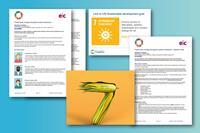Use this activity to connect students’ learning about energy and the carbon cycle to the UN’s Sustainable development goals and help them understand chemistry’s role in solving global issues
There must be a global ban on the burning of fossil fuels to supply energy. What do you think?
In this activity learners will act as a policy makers who need to decide if the burning of fossil fuels should be banned globally. They are introduced to a range of viewpoints from their team of international advisers before debating the pros and cons of banning the burning of fossil fuels. Learners are then asked to write down what their policy for the use of fossil fuels will be and justify their decision.

Sustainability in chemistry

This resource accompanies the Education in Chemistry article Spark students’ interest in sustainable energy for all where you will find more support and suggestions for how to connect your current chemistry teaching with UN sustainable development goal 7: ensure access to affordable, reliable, sustainable and modern energy for all. The perspectives presented by the international team of advisers in the resource will help learners to understand the full challenge goal 7 presents.
Teacher notes
The resource is designed for 14–16-year-olds, but would also work for 11–14-year-olds with support. It should lead to a lively debate.
Before beginning the debate, ensure students have a firm understanding of the chemistry behind climate change using the ideas and tips in How to teach the carbon cycle.
The presentation includes viewpoints from an international advisory team. The student sheet (also available as an editable version) has the same information but in a handout format. The advisory panel members are:
- atmospheric scientist
- economic adviser
- energy company CEO
- financial adviser
- international aid worker
- medical adviser
- scientific impact analyst
You can set up this activity in different ways depending on time available and how much support your learners need. Some of the activities, eg reading through the viewpoints or writing up their own policy, could be set as homework tasks.
Suggested steps
- Introduce the topic.
- Split learners into groups and assign each group a viewpoint: for or against a global ban on fossil fuels.
- Learners read through the viewpoints in the resource and find evidence to support their argument.
- Others in the group may be asked to work out what the counterarguments may be and prepare for questions.
- Individuals or groups present the viewpoint they have been asked to support with evidence (set a time limit for each group and another for follow-up questions).
- Follow the debate with a class vote or discussion.
- Ask learners to write down their own policy, making sure they justify their decision.
Link biofuels to your lessons on sustainable energy and enhance your teaching in this topic area with the SDG 8 article on fermentation and bioethanol.
More resources
- Find experiments and worksheets exploring the potential of solar energy with the Solar spark resources.
- Link to careers with this job profile of a laboratory technician who tests solar panels; find more inspiration with our Fixing the future video.
- Create context with scientific research using starter slides on Recycling plastic bottles into jet fuel and Merging solar cell and battery tech.
- Use our organic chemistry worksheets for 14–16 years, to check knowledge of the underlying chemistry of hydrocarbons and help put it into context.
Downloads
Fossil fuels and global carbon emissions
Presentation | PowerPoint, Size 2.01 mbFossil fuels and global carbon emissions: student sheet
Handout | PDF, Size 0.28 mbFossil fuels and global carbon emissions: student sheet
Editable handout | Word, Size 0.24 mbFossil fuels and global carbon emissions: teacher notes
Editable handout | PDF, Size 0.17 mbFossil fuels and global carbon emissions: teacher notes
Editable handout | Word, Size 0.13 mb



















No comments yet